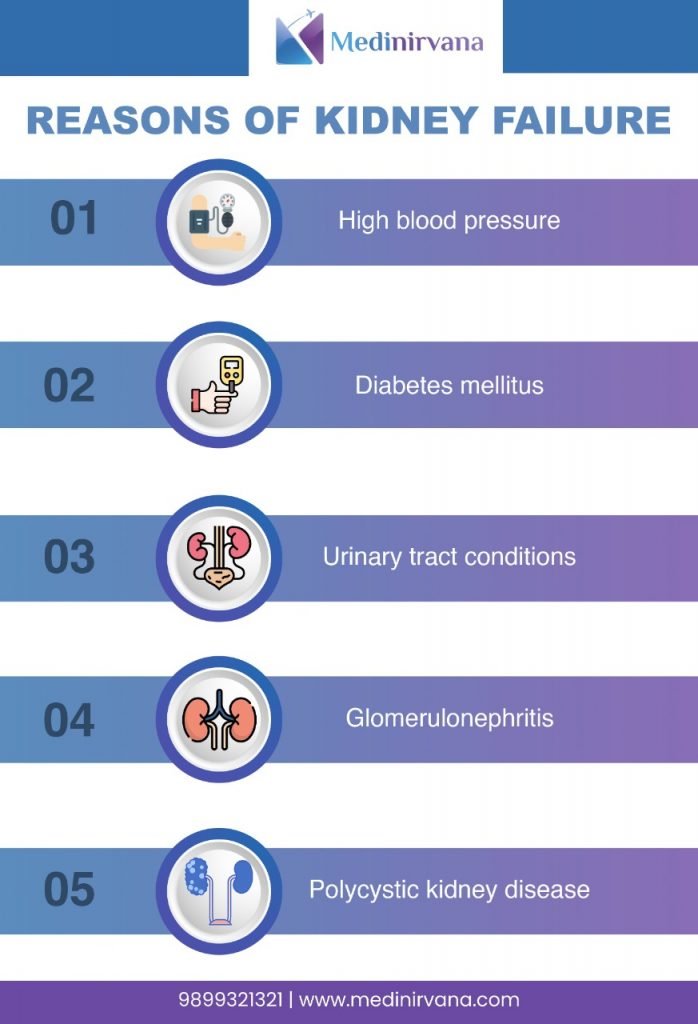Are you looking for assistance to undergo a kidney transplant treatment? Looking for a quick solution to bring an end to the months of wait before your name shows up on the kidney transplant waiting list? If your answers are in the affirmative, it is time for you to know more about medical tourism and planning your kidney transplant in India.
Table Of Contents
Feel free to skip ahead if one topic catches your eye:
- How to plan your kidney transplant in India?
- Kidney transplant: Pre and Post Treatment care in India
- Success Rates of Kidney Transplants in India
- Why India is a popular destination for Kidney Transplants?
- Cost of Kidney Transplants in India
Takeaway
- How to Plan your kidney transplant in India?
There is no denying the fact that travel is the last thing on the mind of people who require medical care. However, you’ll be surprised to learn that more than 6,00,000 patients across the world visit India, one of the world’s most popular medical tourism destinations, for everything from kidney transplants to breast implants and from dental treatment to major heart surgeries. Rising healthcare costs and the never-ending waitlists for transplants are two of the biggest reasons why patients living in countries such as the United States, Canada, Germany, UAE, and the United Kingdom are heading to India.
However, it is important for you to gain a clear and complete understanding of the documentation process so that you don’t have to face hassles at a later period of time.
Documentation For Planning Your Kidney Transplant In India
It is recommended that you should arrange for the following documents before you book your tickets to India:
- Hospital authorisation letter from the existing hospital, recommending treatment in India
- Patient’s photographs
- Patient’s passport and visa copies
- Scan copies of the personal details page of the passport
- Proof of residential address
- Proof of required funds
- Medical documents of the treatments and diagnostic tests
- Passport and visa copies of the attendant and proof of relation with the attendant
- Insurance proof copies (If any)
- Details about the accommodation in India
- A non-objection certificate signed by both parents if the patient is a minor
- Yellow Fever vaccination certificate and Oral Polio Vaccination (OPV) certificate if the patient is from Israel, Pakistan, Nigeria, Kenya, Ethiopia, Afghanistan, or Somalia
In addition to these documents, it is important for you to ensure that you lead an active lifestyle and abstain from nicotine, alcohol, antidepressants, and prohibited substances. Moreover, you should develop a clear and complete understanding about the kidney transplant procedure, its pros and cons, and review and authenticate the claims made by the hospital and the surgeon(s). It is equally important for you to have realistic expectations and keep a positive attitude to life and your wellbeing. Furthermore, you should take all medications as recommended by your doctor and keep them with you before you pack your bags for India. It is also suggested that you should have a detailed word with your surgeon in India and clarify all your doubts, concerns, and queries so that you always make an informed decision.
Medinirvana, one of the leading providers of medical tourism services in India, can help you arrange for everything related to your documentation and the medical tourism trip to India. This will help you concentrate on just packing your bags and avoid getting stressed on how to reach India.
- Kidney transplant: Pre and Post Treatment care in India
It is extremely important for you to follow certain tips and precautions.
- It is important for you to eat a healthy and balanced diet.
- You should try to maintain a healthy weight.
- You should avoid getting anxious or stressed about the treatment procedure.
- You should abstain from nicotine, alcohol, blood thinners, and Non-steroidal anti-inflammatory drugs (NSAIDs), unless otherwise recommended) by your doctor.
- You should always wash your hands before consuming meals.
- After the surgery, you should limit your intake of egg yolks and instead choose low-fat milk, non-fat, or low-fat dairy products.
- You should keep a close check on your blood sugar and blood pressure levels at regular intervals before and after the surgery.
- You should consume a diet rich in whole grains, lean meats, and fresh fruits and vegetables. You should avoid crab, squid, crayfish, fish, prawns, shrimp, Sushi, oysters, mussels, and clams.
- You should avoid pomegranate and grapefruit in raw or juice form, especially if prograf or cyclosporine is recommended to you.
- You should avoid salads from delicatessens or salad bars, unpasteurized juices or ciders, unwashed raw fruits and damaged fruits, sprouts (such as bean sprouts or alfalfa), and unwashed raw vegetables and unwashed salads.
- You should stay hydrated at all times and must enjoy an uninterrupted sleep of at least 7-9 hours.
- If the kidney transplant is performed from a deceased donor kidney, it is important for you to make quick arrangements to reach the hospital. The hospital staff will conduct immediate tests to ensure the donor and recipient are compatible. It means that you don’t have to wait endlessly on the transplant waiting list.
- It is important for you to keep a stock of all the medications prescribed by your doctor in the resident country and keep communicating with both your resident doctor and the surgeon in India to make the right decision.

- Success Rates of Kidney Transplants in India
The success rates of kidney transplants in India is as high as 97 percent though it may vary from hospital to hospital. The success rates are dependent on factors such as the age of the patient, the severity and extent of the patient’s condition, the general and overall health of the patient, availability of kidneys, blood group of the patient, etc. They are also dependent on the behavior of homografts, kidney transplant survival rates in the hospital, the expertise and qualifications of the surgeon, etc.
It is highly important for you to select an eminent kidney transplant clinic and an experienced surgeon so you don’t have to face side effects such as failure of the donated kidney, rejection of the donated kidney, infections, blood clots, or bleeding. You must always choose a hospital based on factors such as reputation, technological expertise, team of surgeons and medical professionals, and mortality rate. It is important to choose a hospital that has rich expertise in deceased donor transplants and living donor transplants and the surgeons and hospital must have enough experience to deal with all types of kidney transplant cases, including complex ones.
- Why India is a popular destination for Kidney Transplants?
Low cost of treatment is one of the biggest factors that encourage patients from all parts of the world to seek medical assistance in India. While many countries have time-consuming and elaborated processes to grant a medical visa, India welcomes patients by offering a quick, streamlined, and hassle-free application process of granting medical visas. Moreover, some insurance companies appreciate the concept of medical tourism because of the significant savings. For instance, some insurance companies provide financial incentives to their customers for surgeries abroad.
Surgeons in some countries of the world are renowned for the expertise and skills in specific areas of surgeries and Indian surgeons and hospitals are known to be the best in the industry. The best thing is that most surgeons in India have completed their qualifications in other countries and received training in English-speaking medical schools before returning back to India. These medical professionals speak multiple languages.
In addition to these advantages, India is home to skilled and experienced Nephrologists and hospitals that offer the best hospitality, state-of-the-art infrastructure, and compassionate care. Also, these eminent hospitals follow the highest standards of hygiene, sanitisation, disinfection, and patient safety.
- Cost of Kidney Transplants in India
The cost of kidney transplants in India is approximately INR 7,00,000-10,00,000 but it may vary as it is dependent on many factors, including but not limited to organ recovery and transport costs, cost of dialysis before the transplant, recovery and rehabilitation, and medications. It is also dependent on the use of advanced techniques, hospital Infrastructure and technology, expertise of skilled surgeons and their teams, the category of room opted, length of stay in the hospital, and post-transplant medications.
Takeaway
There is no denying the fact that the thought of visiting India for a kidney transplant may seem a lot. However, you can say goodbye to all your concerns by trusting Medinirvana, one of the leading providers of medical tourism services in India, which can help you identify the best kidney transplant clinic and surgeon. It will also help you make all the right choices and ensure that your medical tourism trip to India is without any hassles. Contact Medinirvana now!







Leave a Reply